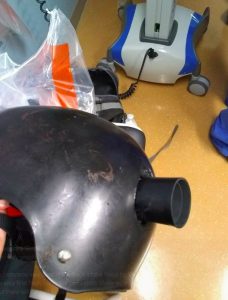About Portland, Berkeley, the Proud Boys, and cops. Why local government matters.
Saturday 4 August 2018:
Portland (Oregon) police show up at a rally by Patriot Prayer and Proud Boys. They intervene in support of the Proud Boys. They blast a “flashbang” projectile at one of the antifascist counterprotesters, in the back of the head. The shot probably would have been fatal had he not been wearing a helmet.

This is what one antifascist protester’s helmet looked like after a Portland cop shot him in the back of the head with a “flashbang” projectile.
There’s a lot to say about this, but it’s been said elsewhere. Right now I’m talking about what regular people can do, even if we aren’t about to go toe to toe with the Proud Boys and their equivalents out in the actual street. What we can do—one of the many, many things we can potentially do—is use our social capital and connections to keep cops and local governments accountable when they attack our friends and overtly side with the fascists.
I’ve lived in Cleveland for a long time.
Our political mess doesn’t lend itself to working directly with elected officials. We don’t have elected officials of any consequence. What we do have is a federal court order to reform the long-standing “pattern and practice of excessive use of force” and a legal mechanism to make that reform actually happen.
There’s a Community Police Commission (CPC) that is, unfortunately, not realistically functioning at this time. It’s supposed to facilitate public participation in developing new police policies as we go through the reform process, which will take at least five years and probably more. All the staff resigned due to sexual harassment on the part of the executive director and the Commission itself lost two members who felt the whole endeavor was ineffectual. CPC can be great! But right now it’s more of a forum than a force.
More importantly though, there’s a Cleveland Police Monitor (CPM). CPM is actually a law firm that was approved by the federal court, at the end of a competitive bidding process, to, well, monitor compliance with the court order and make recommendations to the court. CPM is empowered, among other things, to tell the federal judge that it doesn’t think our newly developed policies are going to accomplish compliance; to call Cleveland’s lawyers back into court to answer for failures; and to propose changes to the court order if they are necessary to ensure Constitutional compliance. CPM is kind of a big deal.
Now that’s a good start. What’s next?
By way of example and inspiration, let me share with you some of the totally achievable plan. The main thing we’re concerned about is that when the Proud Boys or their ilk come to Cleveland, there’s a pretty good chance that Cleveland police will not just stand by when the Proud Boys start attacking queer or trans people of color (which has been their trademark), not just let them have free rein in the streets, but actively and overtly do their dirty work. So let’s get out in front of that problem and make it as difficult as possible for political and operational leadership to look the other way and pretend they don’t know and can’t control what’s going on. Let’s take away their deniability and impose some accountability.
Part of that—but not remotely all of it!—will be getting policies on the books, with enforcement and penalties, by connecting with CPC and CPM. And the first step to doing that is pulling in some friends and finding out who has the resources that are needed.
The good news is that Cleveland has a rapidly self-organizing activist community. We know who to talk to, we know some of their talents and capabilities, and we have some idea of how this type of white-collar organizing fits into the bigger picture. I’m thinking a very informal pilot committee of about five key people can build a persuasive presentation and start to gather the numbers that make effective civilian control a possibility.
This plan is weak on details.
Two things are going on here:
- In these early stages, the bigger plan works better if you don’t plan to every excruciating detail and tell everyone about it.
- Also, I have no idea what I’m doing.
Look, all we can do is all we can do. The first thing you have to go through to be good at something is to be bad at it. The key thing I want you to understand when reading this is that you can work right now, with what you have, coordinating with people you already know, and develop better skills and understanding all along the way.
And when it comes to the protest dynamic in your town, local government really does matter. Adapt your goals and strategies to the situation you’re in and the problems you’re confronting. That’s all we can ask.